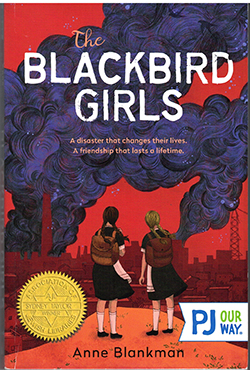
 SAN DIEGO – This novel about the friendship that forms between two preteen girls in a time of great stress hits many important issues. The danger of radiation from a nuclear power plant. Government cover-ups. Antisemitism. Domestic abuse. The Holocaust. The redeeming power of love.
SAN DIEGO – This novel about the friendship that forms between two preteen girls in a time of great stress hits many important issues. The danger of radiation from a nuclear power plant. Government cover-ups. Antisemitism. Domestic abuse. The Holocaust. The redeeming power of love.
Although targeted by the PJ Library for readers 11 years old and up, I believe much older readers will take this novel to heart. It begins with the accident at the Chernobyl Nuclear Power Station in the Ukraine, the place of employment of the fathers of Valentina, who is Jewish, and Oksana, who is not. The explosion killed Oksana’s father and gravely wounded Valentina’s. Furthermore, Oksana’s mother, who had been sunbathing on the roof of their apartment building, needed hospitalization for radiation poisoning.
Oksana had been taught by her abusive father to hate Jews, so when Valentina’s big-hearted mother, Galina, took responsibility for the temporarily parentless Oksana, it caused both girls much discomfort. Treated with kindness by Galina, Oksana wrestled with the fact that this Jewish family clearly was generous and caring versus the derogatory information about Jews she had always been taught by her bigoted father. She struggled over the question whether accepting the friendship and care of this Jewish family was an act of disloyalty to her father, who, were he still alive would have beaten her for having any association with Jews.
Although the government gave little information about the nuclear accident, Soviet citizens eventually came to understand that spreading radiation from the disaster could poison them. Galina decided to take the girls on a trip of over 1,000 miles to Leningrad (formerly and currently St. Petersburg) where Galina’s mother, Rivka, lived. However, when only two train tickets were available, Galina decided to send the two girls ahead on their own. She telephoned her mother to meet the girls near the train station.
Rivka’s experiences as a refugee during World War II, with references to her family being massacred at Babi Yar, provide a back story and some points of comparison to the girls’ odyssey. To escape the invading Nazis, Rivka had traveled by foot during her youth from the Ukraine to Uzbekistan, where exhausted and starving, she was found by a Muslim family and given a home and protection. She and the family’s daughter, Feruza, both treasured a story told by Feruza’s mother that the blackbird is almost magical, for it can walk on land like humans, swim in the sea like fish, and also fly in the sky – a symbol for eternity. Rivka and Feruza decided their friendship would also be eternal, and so too, as it eventually developed, would the crisis-forged friendship of Oksana and Valentina.
The beautifully crafted and written story will widen the world of its young readers. It is not surprising that the book was a Sydney Taylor Award winner of the Association of Jewish Libraries.
*
Donald H. Harrison is editor emeritus of San Diego Jewish World. He may be contacted via donald.harrison@sdjewishworld.com

























